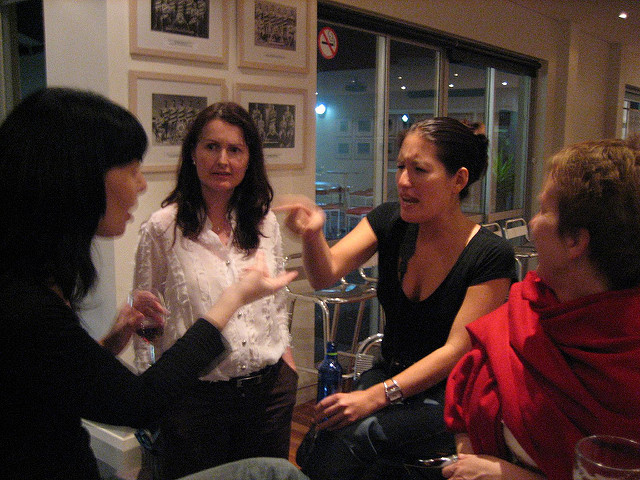
The other day I was on short holiday with my dad, my sister, and her boyfriend.
Sitting at the dinner table, we waited for our food and discussed big changes in our lives, when suddenly I saw my dad and sister sliding into a known habit of each of them digging in and holding their position.
I heard myself thinking, “Oh no, now we have to sit through this meal with a heavy mood, each of them holding onto the perspective that they have a right to their anger.” The image of two rams, locking horns and standing there, motionless, popped into my mind.
I had a very clear image of how the evening was just going to transgress—quiet and heavy. I would try not to get between them and at the same time feel annoyed about the destruction of our otherwise beautiful holiday together. We would finish our meals, drive home, and go to bed upset over the ruin of a lovely summer evening.
Suddenly, I noticed something else.
I noticed my own habit of shutting down. With my entire body retreating further into my chair, I tried not to pay attention, willing myself to remain uninfluenced by their mood, because it was “their thing.” My eyes defocusing, gazing loosely onto the lake, slightly tensing in my upper belly, I focused on breathing to stay uninvolved. I felt myself losing energy as I waited for the evening to transpire, as I knew it would.
In my pause for reflection, I realized that it was not just their thing. Sitting there with them, I too was part of the situation and responsible for how the evening would evolve.
I decided I didn’t want to disappear and allow conflict to take over the evening. I decided to get involved.
I began with my physical reaction to allow for a pragmatic start. Before consciously realizing what I should say or how I should get involved, I did so physically, by moving forward in my chair. Then I started to speak.
Moving forward in my chair and relaxing my belly opened me to feeling my family members’ and my own emotions, instead of separating myself outside of ‘their thing‘. I found myself actually experiencing their feelings of being afraid and hurt. Both my dad and my sister felt this way. And both of them for different reasons.
The anger that they initially expressed was only the outermost layer.
By physically leaning into the situation, I could feel their respective versions of the argument.
I continued to breathe, but this time, but in a way that provided me with energy to move forward with my intention of being there with them. Essentially, I began using my family’s stubbornness in a new way. Instead of calming myself down and not feeling too much, I committed to actively participating.
Making the decision to get involved instead of blaming others was challenging and, in a way, overwhelming.
Daring to take on the challenge, I could recognize why I formerly avoided feeling their pain. It hurt—even more so due to their love for one another, and desire to be seen in the situation.
My old reaction of dealing with this pain, in which I had almost trapped myself, had been to keep quiet and not get involved, in order to stubbornly try to avoid the pain. Through my previous reaction, I presented arrogance towards my loved ones, thinking that they “should be able to understand each other.” Partially, perhaps, because I was afraid to become the target of their anger. And partially due to self-importance.
In this new circumstance, speaking became my method for escaping the habit of shutting up.
I was still afraid. Nevertheless, I just talked and talked through the fear.
I tried to put into words what I was feeling. I put into words not only the anger that they had already voiced, but also the pain and the fear that I could feel was underlying the anger. At one point, the pain became physical. Both of my family members had tears in their eyes. I continued verbalizing everything that I could feel or hear. Then, eventually, the love became physical as well, resulting in even more tears. And ginger moments of reaching out, of feeling each other, of being seen.
It took some time, but the evening ultimately took a different turn than I had initially anticipated.
I could see how not getting involved was the temptingly easy route. Despite the fact that I so strongly believe in taking responsibility for the situations I and others find ourselves in, and despite the fact, that it seems, from an outside perspective, like such a small step. Small steps that internally felt very big. Like the whole situation could get so messy.
I think it did end up a bit messy, but in a nice way. I don’t remember most of what I said. Sometimes what I said didn’t really make sense. But I continued speaking, anyway.
In the end of the night, and still today, I was and am grateful that the two of them listened to me. In doing so, they allowed me to bring to light my version of what was happening and expose the pain that we had formerly buried. They also demonstrated to me that I need not fear their anger turning against me. I can actually contribute a great deal of healing with my vulnerability.
I am also grateful that the four of us at this table created space for the complexity of feeling. We dared to let go of our first reactions to embark on a more open and vulnerable version of the conversation.
Instead of each of us going to bed angry and moody, we ended up sitting next to each other, singing Brecht-Songs over the lake, and feeling far closer to each other than we did before.
The strangest part is, I still feel the pain—both my own, as well as theirs that traveled through me. But it is almost like a memory of pain, a shadow demonstrating that an important shift happened.
Diving into feeling fully and daring to let things get messy with the people I love, is always worth it.
~
Author: Aninia Schwanhaeusser
Image: Flickr/Amanda Wood
Apprentice Editor: Bretton Keating; Editor: Travis May






Read 0 comments and reply